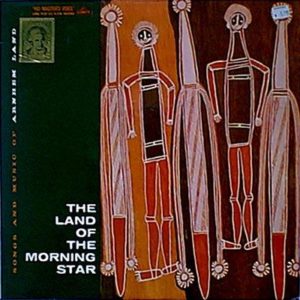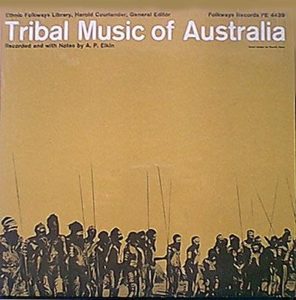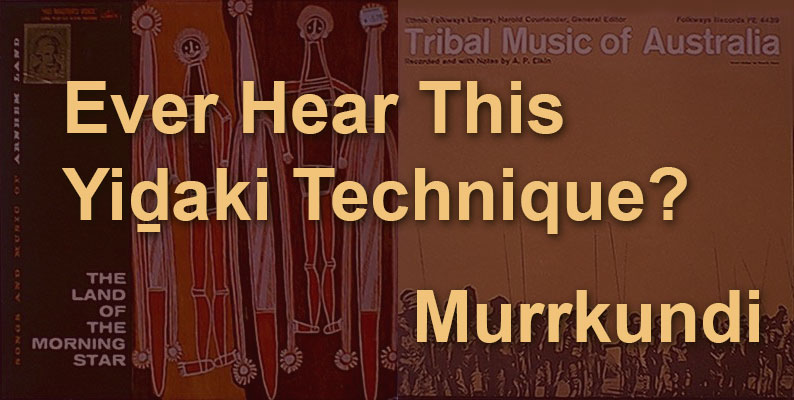
Here’s an unusual yidaki technique you may not have heard. First, we’ll listen to a track from Sandra Le Brun Holmes’ album Land of the Morning Star. She recorded the player “Mudpo” at Milingimbi in 1962. I’d have to check again with Yolŋu friends back in Arnhem Land, but something in the back of my mind says he was a Gälpu clansman. I could be mixing this up with another field recording from Galiwin’ku, though, so a correction would be welcome if anyone out there can provide it. The track is labelled “Murrkundi (the Little Black Bird).”
Yes, you’re hearing right. “Mudpo” is making a little nasal squeak sound on top of normal yidaki technique.
A. P. Elkin caught a more extreme, squeakier version of the technique for his 1953 recording Tribal Music of Australia.

Elkin’s liner notes say:
“the accompaniment for the dance and song of a small bird, called ‘moi kandi’. It has a high squeak which the Puller reproduces at the same time as he blows his didjeridu.”
“Puller” was a term used for didjeridu players by many anthropologists and presumably northern Aboriginal People in the 1950s and 60s, but the term has fallen out of use. I didn’t make a study of the term while I lived in Yirrkala, but the few young Yolŋu I asked about the word looked at me like I was crazy.
Unfortunately, neither Holmes nor Elkin recorded the full song so that we could hear this technique in context, nor did they detail what clan(s) sing it. I never put much time into the issue, but asked some Yolŋu about “murrkundi.” Only a few older yidaki specialists, Djalu’ Gurruwiwi and the recently deceased Datjirri #1 Wunuŋmurra, said they were familiar with the technique. Both had health conditions that made the sound more difficult for them to produce, but gave me a brief demo. Unfortunately, neither were keen to have it filmed. So you just get a quick clip of me.
Now you. As Dr. Ed Harkins, who inspired me to start playing didjeridu, used to say, “this is the kind of thing you should be doing.”
If anybody out there has more information on this subject, please let me know and I’ll post an update.


I’ll try this one tonight when I go home. Thanks again.
Hi
When I commented your video on youtube I didn´t check the link but now that I found this post I can comment here.
I found strange that “Mudpo” seems to be not well known. Holmes said that it was a “virtuoso on the didjeridu”.
Then I read that Alice Gorman tried to find the musicians (Beyond the ‘Morning Star’).
On this link, she is explaining that “Mudpo” could be mis-spelled.
https://www.google.fr/url?sa=t&rct=j&q=&esrc=s&source=web&cd=9&ved=0ahUKEwjLjbyYtIXYAhVGJsAKHUTXBysQFghKMAg&url=https%3A%2F%2Ffiles.ebook.bike%2Fdownload.php%3Fkey%3D%257B%2520.Params.uuid%2520%257D%257D%26id%3D12699634313314%26file%3Dthe-best-australian-science-writing-2014-ashley-hay%26text%3D1&usg=AOvVaw3__hLrnm1ooV86WszG6GOD
First reflex, search Mudpu at Milingimbi. You will find bark paintings and a text where “Mudpu” is cited.
http://www.territorystories.nt.gov.au/bitstream/10070/260002/22/Northern%20Territory%20News_20160117_page21_NTNews_Lifestyle_21.PDF
Ok we are on his track.
On a bark paintings site, I found another spell “Mutpu”.
Another search gave me “Muṯpu” (retroflex t) in association with Djäwa.
https://www.google.fr/url?sa=t&rct=j&q=&esrc=s&source=web&cd=8&ved=0ahUKEwjjj_m64ITYAhXMXBQKHQqWAScQFghOMAc&url=https%3A%2F%2Fses.library.usyd.edu.au%2Fbitstream%2F2123%2F1518%2F1%2FToner%2520rev1.pdf&usg=AOvVaw1YcPqt68Y-Zqr_QSb9I-IP
Mudpo could be the same guy as the singer recorded by Moyle at Milingimbi in 1962 on track03 of http://www.manikay.com/albums/sfnt4.shtml
Of course it would be better if elders from Milingimbi confirm this hypothesis.
Cheers,
Manu
Thanks for all that, Manu. I’ve read text of the article on NASA before, but never saw an actual scan.
Yes, this why I put “Mudpo” in quotes. It’s definitely not spelled correctly, according to current convention. Just knowing Yolŋu languages, I would indeed have guessed it should have been “Muṯpu” even without the existing reference to that name. I just didn’t want to say anything without verifying it, which would be easily done on the ground in Arnhem Land. In fact, I know a great starting point. I’m not sure if he’s still around in the past 8 years since I left Arnhem Land, but Bunbatjiwuy, who sang with Muṯpu on the Moyle recording you referenced, was still alive last I knew. He’s a Djambarrpuyŋu man.
very interesting indeed loved this post than you so much
Hey, interesting blog. I might be able to give some insight to the Elkin recording. The track with the squeak comes from a series of didgeridoo examples recorded by Elkin in 1952 at Bagot Reserve in Darwin. The identity of the “puller” is never revealed, however, Elkin refers to him as a man from Yirrkala. The didgeridoo he uses is interesting as Elkin refers to it as “light plastic, joined together with honey wax”, I take this to perhaps mean PVC pipe.
Thanks! You know, I always meant to ask more people about this during the years I lived in Yirrkala. I guess I kept too busy! I only asked a few people and very few knew what I was talking about.